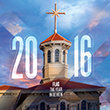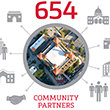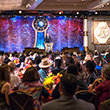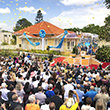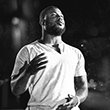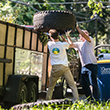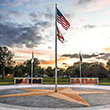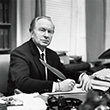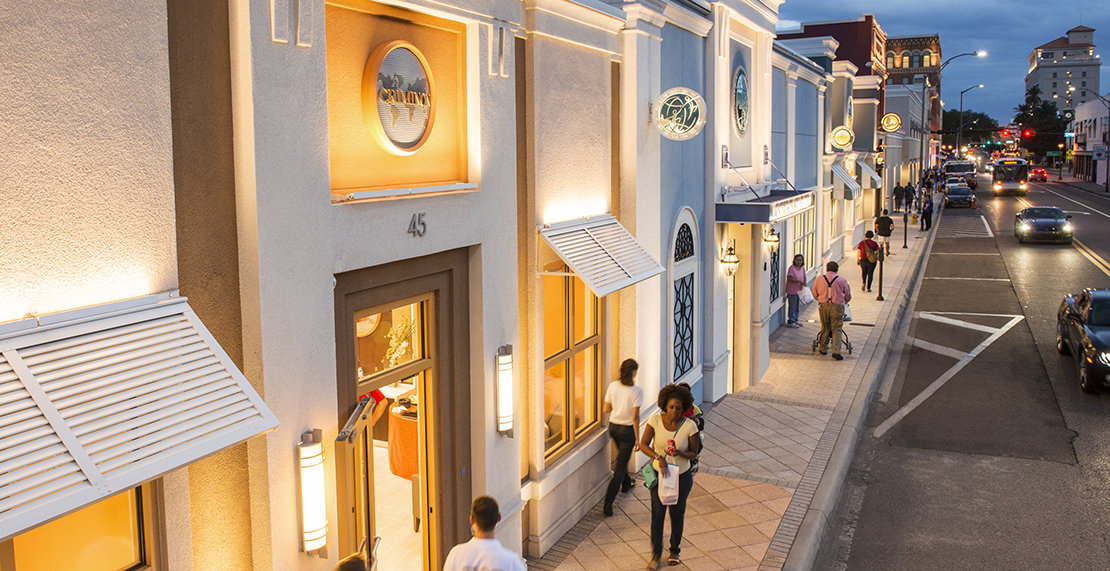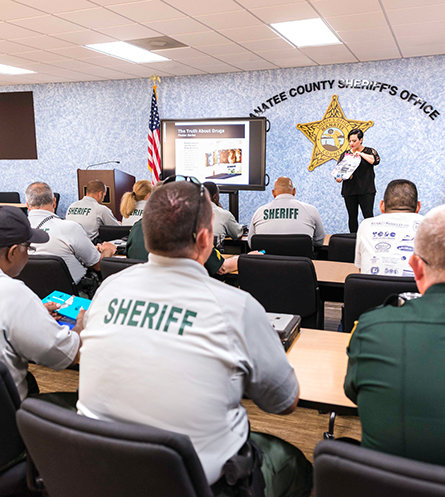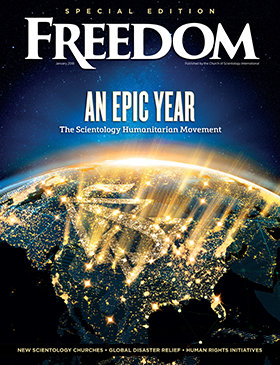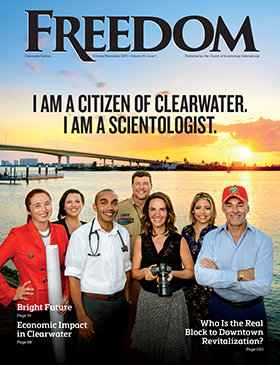Along two blocks on the northeastern side of the intersection of Fort Harrison Avenue and Cleveland Street, six buildings house humanitarian centers opened by the Church of Scientology in July 2015. Throughout 2016, the centers have provided an array of resources to uplift communities from drugs, crime, human rights violations and other societal ills.
Truth About Drugs
To achieve the purpose embodied in its name, Florida Foundation for a Drug-Free World has launched an unprecedented outreach since its new Clearwater location opened in mid 2015: through 330 events held in its headquarters and locations across the city, volunteers have carried its educational message to more than 540,000 youth and adults.
To speed progress toward its goal, the Foundation has established alliances with 380+ area organizations whose members also seek to erase the drug problem. Case in point: Just south of Clearwater lies Lealman, a Pinellas County neighborhood that is unfortunately not well known for beautiful beaches or breathtaking views of the bay, but instead for high rates of drugs, crime, prostitution and human trafficking. It’s a place where no one can take it for granted that kids will receive a cooked meal or a safe ride to school.
Against this backdrop, Foundation for a Drug-Free World joined with Neil Brickfield of the Pinellas Police Athletic League (PAL) and established a partnership to educate Lealman’s at-risk kids on the factual harms of drug abuse and addiction.
Further south, the Director of the Manatee County Sheriff’s Office, Sidney Ettedgui, organized the training of school resource officers on Drug-Free World materials and distributed thousands of The Truth About Drugs booklets countywide.
In the far northwest corner of Florida, Officer Wanda Hulion from Crestview Police Department in Okaloosa County started using The Truth About Drugs educational materials in October 2015. She attended a training seminar at the new Florida Drug-Free World headquarters in March 2016, after which she distributed well over 5,000 booklets in Okaloosa. In October, Officer Hulion participated in a large presentation with a local school at which all young students signed a drug-free pledge.
These Floridians and hundreds more understand the need for education in order to prevent the future generation from starting drug use. That is why they use Drug-Free World’s The Truth About Drugs curriculum, an interactive program which conveys facts on commonly abused street drugs, through compelling firsthand accounts of former users who themselves survived the nightmare of addiction.
Often, what starts with a class of rowdy, disinterested students ends with children who want to do something about the drug problem in their community, including requesting additional copies of booklets to share with others—a good start to achieving drug-free lives.
United for Human Rights
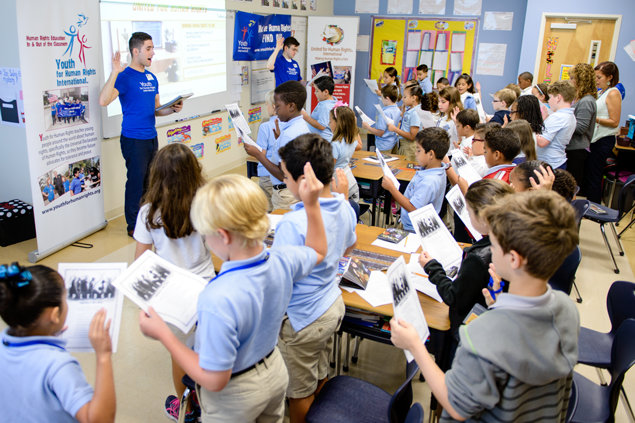
In Clearwater’s United for Human Rights Center, visitors quickly come to understand the premise: human rights are the fabric of human relations; where they exist, tolerance and freedom follow; where they are lost, abuses abound. The State of Florida, last year alone, logged 407 cases of potential human trafficking, 7,537 rape offenses and 4,400 bully-related deaths.
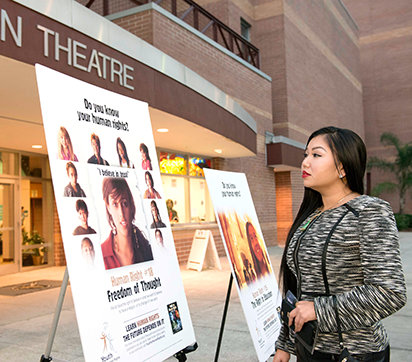
Through 2016, United for Human Rights Florida has worked to increase awareness of human rights by delivering its educational message to 300,000 individuals and community leaders—and by helping 300 organizations, schools and churches carry the message into their own communities.
That message? By broadly teaching and implementing the 30 rights enshrined in the Universal Declaration of Human Rights, a foundation can be built across the world upon which human rights can be achieved for all.
United for Human Rights and its companion Youth for Human Rights International present a wide range of educational materials to that end. Program participants host school seminars, teacher workshops and training events. As a result, more than 200 teachers in Florida used United for Human Rights materials in their classrooms in 2016.
But what about kids who aren’t lucky enough to go to a school that teaches human rights? Christopher King, grandson of the late BB King, is one of the more than 80 community leaders and organizations in Florida now using the United for Human Rights educational program. King added the curriculum to the “Gentleman’s Course” he founded to improve fundamental life and social skills of young people.
To assist King with his goal, United for Human Rights provided all teacher and student materials. His course grew from a dozen to some 100 kids in just six months. Mr. King is determined to instill respect for human rights in every at-risk youth in Hillsborough and Pinellas Counties.
United for Human Rights also strives to educate civic and government leaders on the Universal Declaration. Among those so educated is Juan Jose Sabinas, Mexican Consul in Orlando, who was one of the first to tour Clearwater’s United for Human Rights Center when it opened in summer 2015. Since then, he has brought the educational initiative to nearly 8,000 in the Hispanic community—and has made it his goal to empower every Hispanic citizen of Florida with an understanding of human rights.
The Way to Happiness

Clearwater Police Chief Dan Slaughter echoed that theory when addressing a full audience in the Fort Harrison’s Crystal Ballroom on July 13, 2016. “You have an area that has blight,” he said. “It’s kind of rundown, it’s striving for redevelopment. But people don’t necessarily invest there until they feel that it’s not that way. The police can go out and they can clean up things a little bit, but I can’t keep it that way. To make the community better and less ridden with crime and blight, I need somebody to make the investment.”
Taking up that challenge are local residents and volunteers of The Way to Happiness Association of Tampa Bay, headquartered in Clearwater. The Association makes known the 21 precepts contained in The Way to Happiness, the nonreligious, common sense guide to better living authored by L. Ron Hubbard.
In July 2015, downtown Clearwater saw the opening of The Way to Happiness headquarters on Fort Harrison Avenue. Since then, and under the banner of Precept 12, “Safeguard and Improve Your Environment,” Association volunteers perform at least one cleanup per month. From Clearwater Beach through downtown and the Gateway, down Pinellas Trail and into the streets of North Greenwood, volunteers have been making that precept a reality.
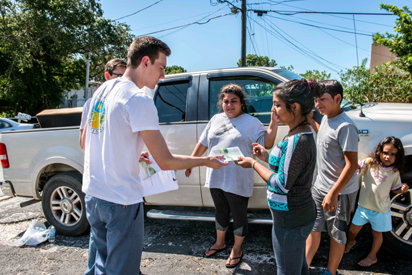
The result: The Way to Happiness volunteers have joined forces with over 300 groups and individuals—including Keep Pinellas Beautiful, Clearwater Community Garden and A Spiritual Change—collecting a total of 500 bags of litter, equivalent to 11,000 pounds of trash, in the last year alone. They have also shared more than 435,000 The Way to Happiness booklets with residents, empowering others to follow suit.
At the July event in the Fort Harrison, Chief Slaughter acknowledged the volunteer effort. “Volunteers have done great work in Clearwater communities, doing neighborhood cleanups and sharing drug prevention information, The Way to Happiness and performing outreach services for those suffering social ills, like homelessness,” he said. “So I thank you for your support, for the community support, for everyone who volunteered.”
Criminon
Born to a drug-addicted mother and schooled into a life of crime by the leader of one of South Florida’s roughest drug gangs, Errol learned the gangster life at an early age.
“My uncle taught me everything,” he said. “While kids were out playing on the street, I knew how to cut coke and shoot a gun by the time I was 12 years old. When I was 17, I went to prison for the first time.”
In 2013 and 2014, more than 4,900 youth were arrested in Pinellas County. On average, the county sees 100 arrests per day of people of all ages, resulting in some 36,500 people each year landing in Pinellas County Jail—that’s nearly 4 percent of the county population. Pinellas County ranks at number 5 of the top 10 counties for prison convictions within Florida.
Yet a life of crime finds no boundaries, behind bars or not. “I was still running the game inside prison, selling dope, getting money,” Errol confesses. “When I was 23 years old, I got sentenced to 15 years—it was my third time to prison.”
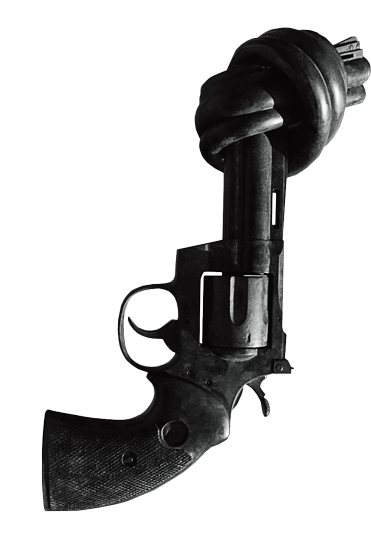
A study conducted by the U.S. Department of Corrections on Florida prisons shows that 27.6 percent of inmates return to prison within three years of release.
Thankfully, Errol’s story didn’t end there. Released two years early for good behavior and put under supervision by a trusting officer, Errol stepped into freedom with a changed heart and a decision to take a different path.
Walking down Fort Harrison Avenue, a woman invited him into the Criminon Center. “We were two different people, but her kindness and care amazed me.”
Criminon, an international nonprofit, provides rehabilitative programs to inmates and ex-offenders. Its curriculum comprises basic life skills and common sense educational tools to help restore self-respect and effectively halt the revolving door of justice.
Criminon Florida provides its life skills curriculum through on-site seminar delivery and correspondence courses. Over 900 students participate in correspondence courses at any given time, shepherded through the process with the help of close to 100 volunteers. That team of volunteers also delivers rehabilitation workshops and crime prevention seminars in jails, prisons and detention centers across Florida.
In the past year, Criminon has graduated more than 1,200 applicants on the full curriculum. Those who have completed the program become staunch advocates for its use by other inmates.
“I have a new life,” Errol said. “The program is simple and powerful. People can find happiness; they can get the motivation, knowing that they don’t have to live the way they did before.”
Citizens Commission on Human Rights
Within one year, from its new headquarters in downtown Clear-water, the Citizens Commission on Human Rights (CCHR) Florida filed 900 mental health abuse complaints—more than twice the number of complaints filed in all 10 years before 2015. And this is none too soon.
Florida, like the rest of the country, is presenting a mountainous challenge to the rights of mental health patients and addressing abuses. One such challenge comes from Florida’s Baker Act, under which 193,000 Floridians—32,000 of them being minors—were involuntarily committed in the past year alone. CCHR launched an information campaign which warned 140,000 families that children are being committed without the consent or knowledge of their parents. In addition, CCHR provided 20,000 parents with legal forms they can use to protect their children from being “Baker Acted.”
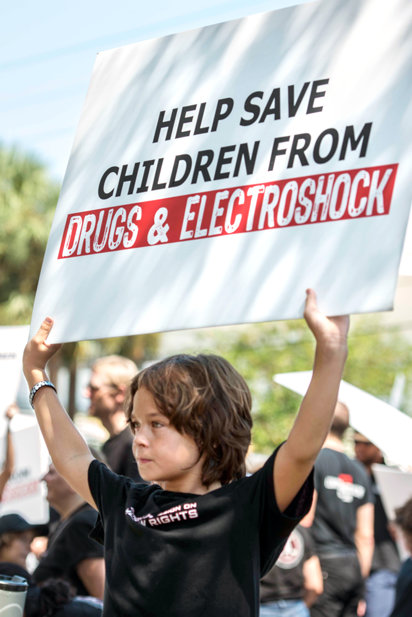
Combing through numerous bills at the state capitol in Tallahassee, CCHR identified more than 100 in the 2016 Florida legislative session as being detrimental to the human rights of Florida residents. Among other dangers, these bills proposed: controversial mental health education programs in schools; extending the authority for prescribing toxic psychiatric drugs to children from physicians to their assistants or advanced registered nurses; and most dangerous of all—allowing any mental health practitioner to label a person with a mental disease simply because that person denies they have that so-called disease.
In the first eight weeks of 2016, thanks to the efforts of CCHR members and associates, all of the dangerous bills were either killed or made better.
Every week, CCHR Florida rescues two or three individuals from psychiatric imprisonment.
In one such case, a 5-year-old who had thrown a tantrum was Baker Acted and admitted to Central Florida Behavioral Center without her mother’s knowledge or consent. When she was finally informed, the mother went to the behavioral center, but staff told her she wasn’t permitted to visit, much less even see, her terrified daughter until the approved visiting day—Friday, which was four days away. Luckily the girl’s grandmother called CCHR, who explained the family’s rights under the Baker Act. The mother was able to return to the facility with her daughter’s father and eventually obtain her safe release.
“By abusing the rights of one individual, you effectively abuse the rights of all,” said CCHR Florida President Diane Stein. “But first and foremost we have to protect the next generation.”
Volunteer Ministers
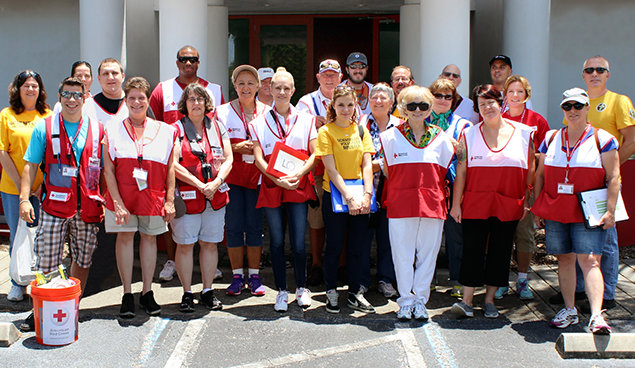
Florida has more than its share of natural disasters, added to the normal incidence of human disasters. Responding to this challenging environment, the Florida Scientology Volunteer Mini-sters are equipped with skills and training so they can always back up their motto, “Something can be done about it,” with quick action.
Between emergency responses, the Volunteer Ministers continually work to prevent and prepare. Since the opening of their new headquarters in Clearwater in July 2015, they have held 231 events to help and to teach others how to help.
The Community Emergency Response Team (CERT) model was developed and implemented in 1985 to answer a need for trained civilians who could be instantly mobilized to meet the demands of a disaster. In 2016, the Scientology Volunteer Ministers hosted the CERT training of two dozen volunteers for local disaster preparedness. These fully CERT-trained Volunteer Ministers are at the ready to serve their community in any natural disaster.
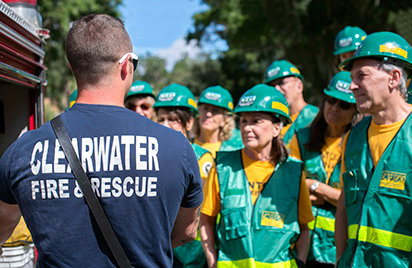
The Florida Volunteer Ministers partner with nonprofit groups such as OneBlood to provide safe, available and affordable blood. Six times during 2016 one of OneBlood’s iconic Big Red Buses has rolled up at the southeast corner of the Church of Scientology’s Flag Building and members of the local Clearwater community, gathered by the Volunteer Ministers, have donated literally hundreds of pints of blood.
In 2016 the Florida Volunteer Ministers helped the Red Cross with its Home Fire Campaign, intended to reduce the number of deaths and injuries caused by home fires by 25 percent over the next five years. Studies show that 4 percent of homes without smoke alarms represent nearly 40 percent of home fires, and that working smoke alarms can double someone’s prospect of surviving a home fire. In 2016, Scientology Volunteer Ministers of Florida joined the Red Cross for eight work parties that installed 1,400 smoke detectors in more than 400 area homes.
Beyond the acute disasters brought about by hazardous environments and Mother Nature, however, the Scientology Volunteer Ministers wield an entire range of practical educational tools to alleviate any life situation and to improve conditions for the better—whether it be in communication, personal relationships, parenting, education, drug and alcohol use, the workplace, handling stress and much more. Simple study courses, available at the Clearwater Volunteer Minister Center or online to anyone at no charge, teach these Scientology Tools for Life.

